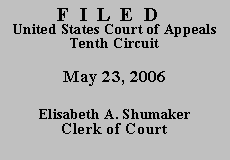

| In re: SUTRO-SANDIA
CORPORATION
Debtor. ------------------------------------------- SUTRO-SANDIA CORPORATION, Appellant, v. NORMA J. HURT, estate of, Appellee. |
|
Appellant appealed the bankruptcy court's order modifying the automatic stay to the district court. A magistrate judge concluded that the bankruptcy judge did not abuse his discretion and recommended that the appeal be dismissed. The district court adopted the recommendation and dismissed the appeal.
Appellant appeals to this court, arguing that the New Mexico bankruptcy court lacked the authority to modify the automatic stay without notice to the parties, and that even if it did have that authority, its exercise of that authority was an abuse of its discretion. Appellant has also filed a motion to strike the 100 or so pages of Arizona, Nevada, and Supreme Court documents appellee provided this court in her appendix to show that the Arizona bankruptcy judge's characterization of appellant's New Mexico filing was correct. Appellee opposes the motion to strike, and also argues that this appeal is moot because the Arizona proceedings appellant sought to stay have been concluded.
We grant appellant's motion to strike because the documents in appellee's appendix were not presented to the New Mexico bankruptcy court and were not mentioned by that court in its order.
Further, we dismiss this appeal as moot. Even if the New Mexico bankruptcy court did abuse its discretion by modifying the automatic stay without notice to the parties, an issue we need not decide, appellant has neither specified any relief this court can give him nor disputed appellee's assertion that the Arizona proceedings he sought to stay have been concluded.
Appellant's motion to strike is granted. This appeal is DISMISSED as moot.
Entered for the Court
Circuit Judge
*. After examining the briefs and appellate record, this panel has determined unanimously that oral argument would not materially assist the determination of this appeal. See Fed. R. App. P. 34(a)(2); 10th Cir. R. 34.1(G). The case is therefore ordered submitted without oral argument. This order and judgment is not binding precedent, except under the doctrines of law of the case, res judicata, and collateral estoppel. The court generally disfavors the citation of orders and judgments; nevertheless, an order and judgment may be cited under the terms and conditions of 10th Cir. R. 36.3.